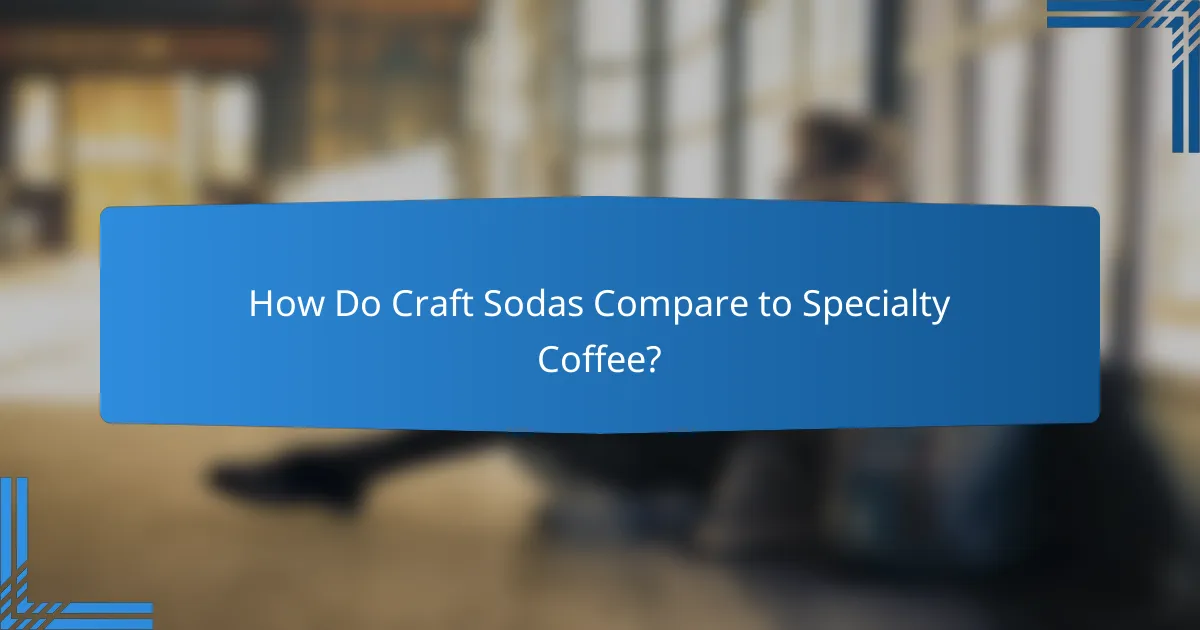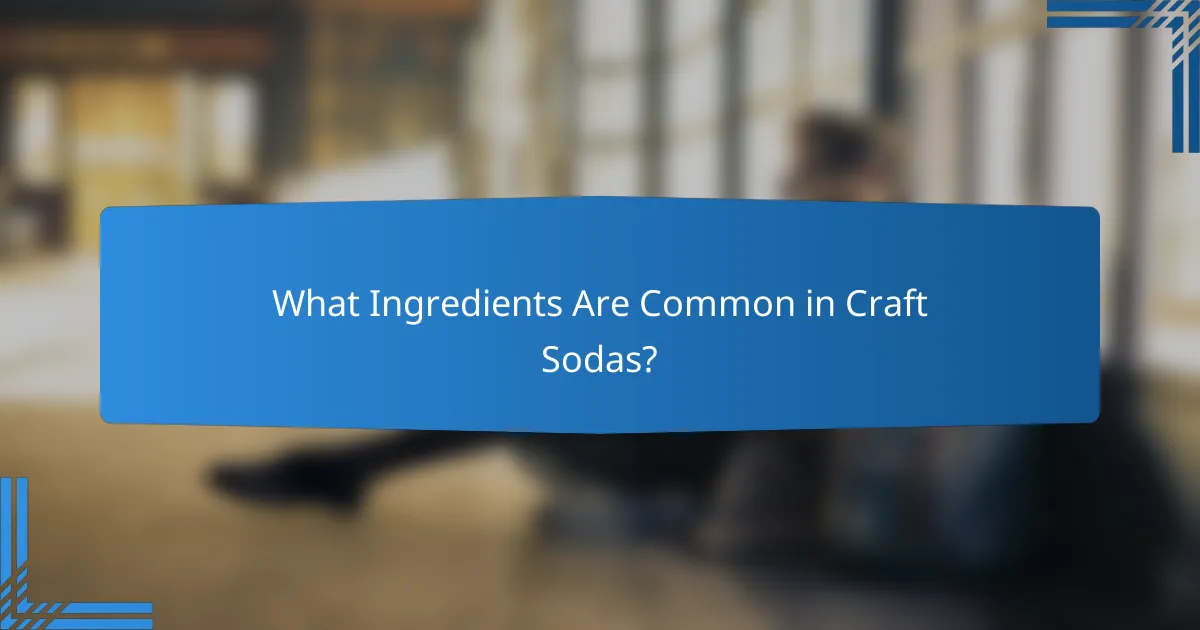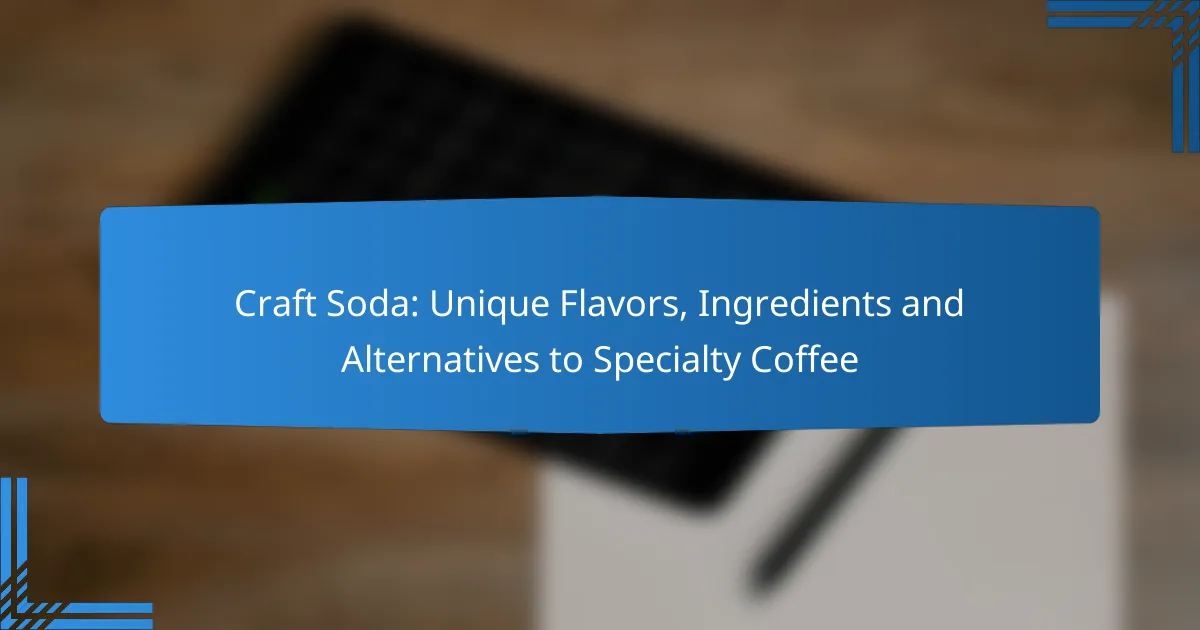Craft soda presents an exciting array of unique flavors and ingredients that distinguish it from conventional soft drinks. With an emphasis on natural sweeteners and distinctive flavor extracts, these artisanal beverages offer a refreshing alternative to specialty coffee, appealing to those seeking new taste experiences without the caffeine kick.

What Are the Unique Flavors of Craft Soda?
Craft soda offers a diverse range of unique flavors that set it apart from traditional soft drinks. These flavors often incorporate unusual ingredients, providing a refreshing alternative for those looking to explore beyond the typical cola or lemon-lime options.
Fruit-infused varieties
Fruit-infused craft sodas are popular for their vibrant and refreshing taste. Common flavors include combinations like raspberry-lime, blood orange, and hibiscus. These sodas often use real fruit extracts or purees, enhancing the natural sweetness and providing a more authentic flavor profile.
When selecting fruit-infused options, look for those that use organic ingredients or have no added sugars to maximize health benefits. Many brands also offer seasonal fruit flavors, making them a fun choice for summer gatherings.
Herbal and botanical blends
Herbal and botanical craft sodas incorporate ingredients like lavender, rosemary, and chamomile, creating unique flavor experiences. These blends often provide a more complex taste, appealing to those who enjoy herbal teas or floral notes in their beverages.
Consider trying sodas that feature a mix of herbs and spices, as they can offer a refreshing twist on traditional flavors. For instance, a soda with basil and cucumber can be incredibly refreshing on a hot day.
Spicy and savory options
Spicy and savory craft sodas are gaining traction, appealing to adventurous palates. Flavors like jalapeño-lime or ginger-turmeric provide a kick that can be both invigorating and satisfying. These sodas often balance heat with sweetness, creating a unique taste sensation.
When exploring spicy options, be mindful of the heat level. Some brands offer milder versions, while others pack a punch, so check the label if you’re sensitive to spice.
Seasonal and limited-edition flavors
Seasonal and limited-edition craft sodas often highlight unique ingredients that reflect the time of year. For example, pumpkin spice sodas are popular in the fall, while refreshing mint varieties may emerge in the summer. These limited offerings can create excitement and encourage consumers to try new flavors.
Keep an eye out for local craft soda makers who may release exclusive flavors during holidays or special events. Sampling these limited-edition sodas can be a fun way to experience the creativity of craft beverage producers.

How Do Craft Sodas Compare to Specialty Coffee?
Craft sodas and specialty coffee differ significantly in flavor, caffeine content, and health benefits. While craft sodas offer a wide range of unique flavors, specialty coffee is known for its rich, complex profiles and caffeine kick.
Flavor profiles
Craft sodas are celebrated for their innovative and diverse flavor profiles, ranging from fruity and floral to spicy and herbal. Ingredients like hibiscus, ginger, and various fruits can create refreshing combinations that are often less sweet than traditional sodas. In contrast, specialty coffee flavors are influenced by the bean origin, roast level, and brewing method, resulting in a spectrum of tastes from nutty to chocolatey.
For example, a craft soda might feature a blend of elderflower and lemon, while a specialty coffee could present notes of caramel and berry, showcasing the distinct characteristics of the coffee beans.
Caffeine content differences
Caffeine content is one of the most notable differences between craft sodas and specialty coffee. Most craft sodas are caffeine-free or contain minimal caffeine, typically around 10-30 mg per serving, making them a suitable option for those avoiding stimulants. In contrast, specialty coffee generally contains significantly higher caffeine levels, often ranging from 95 to 200 mg per cup, depending on the brewing method and serving size.
This difference means that if you’re looking for an energy boost, specialty coffee is the better choice, while craft sodas provide a flavorful alternative without the jitters.
Health benefits
Craft sodas can offer some health benefits, particularly when made with natural ingredients and less sugar than traditional sodas. Ingredients like ginger can aid digestion, while herbal infusions may provide antioxidant properties. However, many craft sodas still contain added sugars, so moderation is key.
Specialty coffee, on the other hand, is often praised for its potential health benefits, including improved cognitive function and a lower risk of certain diseases. Studies suggest that moderate coffee consumption may be linked to a reduced risk of conditions like Parkinson’s disease and type 2 diabetes, making it a popular choice for health-conscious consumers.

What Ingredients Are Common in Craft Sodas?
Craft sodas often feature a variety of unique ingredients that set them apart from mass-produced soft drinks. Common components include natural sweeteners, distinctive flavor extracts, and various carbonation sources, all contributing to their artisanal appeal.
Natural sweeteners
Natural sweeteners are a hallmark of craft sodas, providing a healthier alternative to refined sugars. Common options include cane sugar, agave syrup, and honey, which can enhance the flavor profile while reducing the glycemic impact. Some brands may even use stevia or monk fruit for a zero-calorie option.
When selecting a craft soda, check the ingredient list to ensure the sweetener aligns with your dietary preferences. For instance, those avoiding sugar may prefer sodas sweetened with stevia, while others may enjoy the rich taste of cane sugar.
Unique flavor extracts
Craft sodas often utilize unique flavor extracts to create distinctive tastes that appeal to adventurous palates. Ingredients like hibiscus, lavender, and ginger are popular choices, offering a refreshing twist compared to traditional flavors like cola or lemon-lime. These extracts can be sourced from natural herbs, fruits, and spices.
Experimenting with different flavor combinations can lead to exciting discoveries. For example, a soda infused with rosemary and lemon can provide a sophisticated alternative to more common beverages.
Carbonation sources
The source of carbonation in craft sodas can vary significantly, impacting both texture and taste. Many craft sodas use natural carbonation methods, such as fermentation, which can impart subtle flavors and a smoother mouthfeel. Others may opt for forced carbonation, which is more common in commercial production.
When choosing a craft soda, consider how the carbonation method affects your drinking experience. Natural carbonation often results in a softer bubble, while forced carbonation can create a sharper, more effervescent feel. Look for brands that clearly state their carbonation process for a more informed choice.

What Are the Best Craft Soda Brands?
The best craft soda brands offer unique flavors and high-quality ingredients, appealing to those seeking alternatives to traditional soft drinks. Brands like Fentimans, Boylan Bottling Co., and Q Drinks stand out for their distinctive offerings and commitment to craftsmanship.
Fentimans
Fentimans is renowned for its botanically brewed sodas, which are crafted using natural ingredients and traditional methods. Their flavors, such as Victorian Lemonade and Rose Lemonade, are often made with real fruit and herbal extracts, providing a rich taste experience.
When choosing Fentimans, consider their unique brewing process, which involves fermentation. This method not only enhances flavor but also gives the sodas a slight effervescence that sets them apart from typical soft drinks.
Boylan Bottling Co.
Boylan Bottling Co. specializes in small-batch sodas that emphasize authentic flavors and quality ingredients. Their offerings include classic flavors like Birch Beer and Cream Soda, made with cane sugar instead of high fructose corn syrup.
For those looking for a nostalgic taste, Boylan’s sodas are a great choice. They maintain a commitment to using natural ingredients, which can appeal to health-conscious consumers seeking alternatives to mass-produced beverages.
Q Drinks
Q Drinks focuses on creating high-quality mixers that enhance cocktails and can be enjoyed on their own. Their sodas, such as Q Ginger Beer and Q Tonic, are crafted with real ingredients and less sugar than many traditional sodas, making them a healthier option.
When selecting Q Drinks, consider their versatility. These sodas are not only refreshing on their own but also pair well with spirits, making them a popular choice for cocktail enthusiasts looking for premium mixers.

How to Choose Craft Soda for Your Subscription?
Choosing craft soda for your subscription involves considering flavor profiles, ingredient sourcing, and brand reputation. These factors will help you select beverages that align with your taste preferences and values.
Flavor preferences
When selecting craft soda, start by identifying your flavor preferences. Craft sodas come in a wide range of unique flavors, from traditional options like root beer and ginger ale to innovative blends such as lavender lemonade or spicy chili mango.
Consider trying a variety pack to explore different flavors before committing to a subscription. Many brands offer sampler boxes that allow you to taste multiple options, helping you find your favorites.
Ingredient sourcing
Ingredient sourcing is crucial in the craft soda industry, as many brands prioritize natural and organic components. Look for sodas made with real fruit juices, natural sweeteners like cane sugar or honey, and no artificial additives.
Research brands to understand their sourcing practices. Some companies may highlight local ingredients or sustainable farming practices, which can enhance the overall quality and taste of the soda.
Brand reputation
Brand reputation plays a significant role in your craft soda selection. Look for companies that have positive reviews and a strong presence in the craft beverage community. Customer feedback can provide insight into flavor consistency and overall satisfaction.
Additionally, consider brands that engage with their customers through social media or events. A brand that values customer interaction often reflects a commitment to quality and innovation in their products.

What Are the Alternatives to Specialty Coffee?
Alternatives to specialty coffee include various beverages that offer unique flavors and experiences without relying on traditional coffee. These options can provide similar enjoyment and energy boosts while catering to different taste preferences and dietary needs.
Herbal teas
Herbal teas are a popular alternative to specialty coffee, made from a variety of plants, flowers, and spices rather than traditional tea leaves. They come in numerous flavors, such as chamomile, peppermint, and hibiscus, offering a caffeine-free option that can be enjoyed hot or cold.
When choosing herbal teas, consider the benefits of each type. For example, chamomile is known for its calming effects, while peppermint may help with digestion. Many herbal teas can be steeped for several minutes to extract their full flavor, and you can sweeten them with honey or agave syrup if desired.
To enjoy herbal teas, experiment with different blends and steeping times to find your preferred taste. Look for high-quality, organic options to ensure the best flavor and health benefits. Avoid overly sweetened commercial varieties to maintain a healthier beverage choice.
